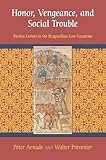Honor, Vengeance, and Social Trouble : Pardon Letters in the Burgundian Low Countries / Walter Prevenier, Peter Arnade.
Material type: TextPublisher: Ithaca, NY : Cornell University Press, [2015]Copyright date: ©2015Description: 1 online resource (256 p.) : 9 halftones, 1 mapContent type:
TextPublisher: Ithaca, NY : Cornell University Press, [2015]Copyright date: ©2015Description: 1 online resource (256 p.) : 9 halftones, 1 mapContent type: - 9780801455766
- Crime -- Benelux countries -- History -- To 1500 -- Sources
- Crime -- Benelux countries -- History -- To 1500 -- Sources
- Pardon -- Benelux countries -- History -- To 1500 -- Sources
- Pardon -- Benelux countries -- History -- To 1500 -- Sources
- Sociological jurisprudence -- Benelux countries -- History -- To 1500 -- Sources
- Sociological jurisprudence -- Benelux countries -- History -- To 1500 -- Sources
- Medieval & Renaissance Studies
- Religious Studies
- HISTORY / Medieval
- Criminality, social concerns, public violence, history of legality, legal resolution, legal disputes, historical sources
- 364.6/3 23
- DH175 .A76 2015eb
- online - DeGruyter
| Item type | Current library | Call number | URL | Status | Notes | Barcode | |
|---|---|---|---|---|---|---|---|
 eBook
eBook
|
Biblioteca "Angelicum" Pont. Univ. S.Tommaso d'Aquino Nuvola online | online - DeGruyter (Browse shelf(Opens below)) | Online access | Not for loan (Accesso limitato) | Accesso per gli utenti autorizzati / Access for authorized users | (dgr)9780801455766 |
Frontmatter -- Contents -- Acknowledgments -- Abbreviations -- The Forgiving Prince -- Chapter 1. Social Discord -- Chapter 2. Violence, Honor, and Sexuality -- Chapter 3. Marital Conflict -- Chapter 4. Actress, Wife, Or Lover? -- People and Their Stories -- Bibliographical Note -- Index
restricted access online access with authorization star
http://purl.org/coar/access_right/c_16ec
Among the more intriguing documentary sources from late medieval Europe are pardon letters—petitions sent by those condemned for serious crimes to monarchs and princes in France and the Low Countries in the hopes of receiving a full pardon. The fifteenth-century Burgundian Low Countries and duchy of Burgundy produced a large cache of these petitions, from both major cities (Bruges, Ghent, Antwerp, and Dijon) and rural communities. In Honor, Vengeance, and Social Trouble, Peter Arnade and Walter Prevenier present the first study in English of these letters to explore and interrogate the boundaries between these sources' internal, discursive properties and the social world beyond the written text.Honor, Vengeance, and Social Trouble takes the reader out onto the streets and into the taverns, homes, and workplaces of the Burgundian territories, charting the most pressing social concerns of the day: everything from family disputes and vendettas to marital infidelity and property conflicts—and, more generally, the problems of public violence, abduction and rape, and the role of honor and revenge in adjudicating disputes. Arnade and Prevenier examine why the right to pardon was often enacted by the Burgundian dukes and how it came to compete with more traditional legal means of resolving disputes. In addition, they consider the pardon letter as a historical source, highlighting the limitations and pitfalls of relying on documents that are, by their very nature, narratives shaped by the petitioner to seek a favored outcome. The book also includes a detailed case study of a female actress turned prostitute.An example of microhistory at its best, Honor, Vengeance, and Social Trouble will challenge scholars while being accessible to students in courses on medieval and early modern Europe or on historiography.
Mode of access: Internet via World Wide Web.
In English.
Description based on online resource; title from PDF title page (publisher's Web site, viewed 26. Apr 2024)


